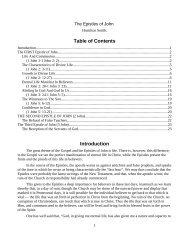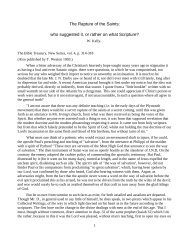An Exposition of Revelation .pdf
An Exposition of Revelation .pdf
An Exposition of Revelation .pdf
You also want an ePaper? Increase the reach of your titles
YUMPU automatically turns print PDFs into web optimized ePapers that Google loves.
mere man, but the Lord. Such terms alone become One who is divine. He who is first is necessarily<br />
God; and He who is first, being God, must certainly be last. Jesus declares Himself to be all this; yea,<br />
more than this, "the living one, and I became dead." He deigned not only to become man, but as<br />
willingly to die, cost what it might, as His death did everything to blot out the evil and prepare for all<br />
blessing. The phrase is the strongest way <strong>of</strong> putting the matter. It is not merely that He died: this is not<br />
quite what He says here, though it is said elsewhere, and very truly. He says that He "became" dead.<br />
This forcibly implies His own willingness to die, as indeed He became what did not belong to Him<br />
personally, and what seemed extraordinarily incongruous with the glorious person as already<br />
described. Is it not conveyed in the peculiarity <strong>of</strong> the phrase? So careful is the Holy Ghost to watch<br />
over the dignity <strong>of</strong> Christ even in that which told out the depths <strong>of</strong> His humiliation. "<strong>An</strong>d, behold, I am<br />
living unto the ages <strong>of</strong> the ages." He is the vanquisher <strong>of</strong> death, and <strong>of</strong> him who had its power. We<br />
must leave out the word "Amen," which here, being spurious, only and evidently mars the sense.<br />
Let it suffice once for all to say that the text adopted rests on the basis <strong>of</strong> the ancient and best<br />
authorities. There is positive evidence <strong>of</strong> a convincing and satisfactory kind for the insertions,<br />
omissions, or changes throughout. Do not imagine that in this there is arbitrary innovation. The real<br />
innovators were those who departed by slip or by will from the very words <strong>of</strong> the Spirit. Arbitrariness<br />
now would be in maintaining what has insufficient authority against that which is as certain as can be.<br />
Error surely is not in seeking the oldest and best supported text, but in allowing tradition to tie us to<br />
comparatively modern and certainly to mistaken, if not corrupted, readings. We are bound in<br />
everything to yield to the highest authority, with the context to help us in deciding where the best<br />
manuscripts differ as they do. So in the next words our Lord really says, "<strong>An</strong>d I have the keys <strong>of</strong> death<br />
and <strong>of</strong> hades"; and who but He could say them? Not so runs the common text; but that is the true<br />
order. No one goes to Hades before he dies, Death being in relation to the body, Hades to the separate<br />
spirit. How truly Christ died and lived, that He might be Lord <strong>of</strong> both dead and living!<br />
"Write therefore [improperly omitted] the things which thou sawest, and the things which are,<br />
and what is* about to take place after these." This gives us, as is familiar to most Christian readers, the<br />
general threefold division <strong>of</strong> the book <strong>of</strong> <strong>Revelation</strong>. The things that he saw were the glory <strong>of</strong> Christ in<br />
relation to this book, as described in the first chapter, on which we have already touched. Short as the<br />
account is, one can hardly exaggerate its importance in itself and for all that follows; for it is the Lord<br />
revealed as assuming formally a judicial character. "The things which are" express not merely the then<br />
present, but the prolonged condition set forth in the addresses to the seven churches. The expression is<br />
striking; because, while applying to the existing seven assemblies, it naturally conveys (when the<br />
epistles to them are adequately understood) that the churches were somehow to exist continuously. A<br />
formal prophecy would have falsified the church's hope as a constant and vital reality. Divine wisdom<br />
gave such an extension to "the things which are" as should bear on the successive states <strong>of</strong> the church<br />
as long as it should be here on earth. We can see now why it was. Possibly, when the epistles were<br />
sent out in the days <strong>of</strong> John, no particular emphasis might be laid on "the things that are"; the saints<br />
would naturally be absorbed in the call on themselves. But inasmuch as analogous states have since<br />
gone on to the present, the immense force such a phrase when duly weighed carries in itself becomes<br />
evident. Nothing would then be allowed to weaken waiting for Christ as our proximate hope; but if He<br />
tarried, it is an abiding appeal as long as the church abides here below.<br />
* It is not without interest to note the singular, which puts together as a mass the future "after<br />
these things" "The things which are" we find in the plural, each <strong>of</strong> them being distinctive in a way not<br />
so applicable to the judgments on the world in the Seals, Trumpets, and Vials, which series differ not<br />
so much in kind as in growing severity, which is morally just.<br />
12






